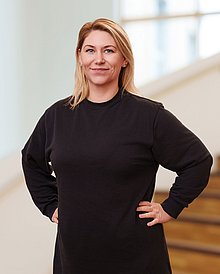Witten/Herdecke University researches the collaboration between humans and AI
Dr. Alina Tausch represents the Chair of Personnel and Organizational Psychology and takes over the management of the Bachelor's degree course in Management & Psychology (B. Sc.).

Artificial intelligence (AI) has long been part of our everyday lives - but what impact does it have on our working world? How can humans and AI be meaningfully integrated into teams? And what conditions are needed for collaboration to succeed? Dr Alina Tausch, who will take over as Professor of Personnel and Organisational Psychology and Head of the Management & Psychology (B. Sc.) degree programme at Witten/Herdecke University (UW/H) in the summer semester of 2025, is looking into these questions.
AI as a team member?
Alina Tausch's research focusses on human-AI interaction in the workplace. She is particularly interested in how AI technologies affect the division of labour, decision-making processes and the well-being of employees. "AI can act as a team member in the future. But to do so, we need to understand how this collaboration can be organised and what challenges it entails," says Tausch. In previous research projects, she has already looked at the role of robotics in the world of work, for example in the field of service robotics in the health care system or human-robot collaboration in industry. One example is the use of adaptive robotic arms that could relieve employees of monotonous tasks - a development that raises questions about work organisation and acceptance.
Psychological perspectives on the working world of the future
As an expert in social, work and organisational psychology, Dr Alina Tausch is also investigating how AI technologies affect motivation, team dynamics and decision-making. Of particular relevance here is the question of the conditions under which people perceive AI as support - and when they mistrust it. "An AI that is used in medical diagnostics, for example, must not only be technically reliable, but must also be designed in such a way that it gains the appropriate level of trust from users," explains Tausch. In a current project, she is working with partners from the fields of psychology and business informatics to develop a symptom checker for skin diseases that adapts its communication behaviour to the individual characteristics of the user.
Application-oriented teaching for the future of the working world
Alina Tausch also focusses on practical relevance in her teaching. Students on the Management & Psychology (B. Sc.) degree programme not only learn theoretical principles, but also apply them directly to current issues in work design and organisational psychology. "It is important to me that students understand how psychological methods can contribute to designing sustainable work processes," she explains. She attaches particular importance to interactive formats in which students develop their own questions and apply empirical methods - for example on the factors and procedures that influence successful personnel selection.
Photos for download
Contact person

Svenja Malessa
Press Officer
Administration | Communication & Marketing
Alfred-Herrhausen-Straße 48
58455 Witten
Room number: 2.F05
